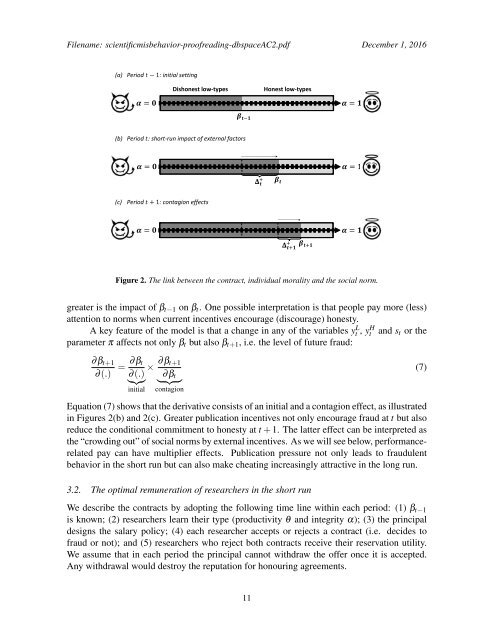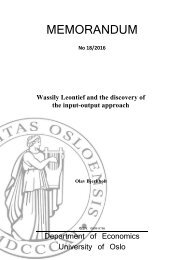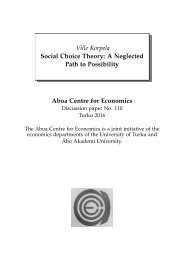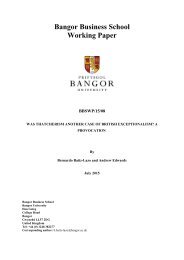Cheat Perish? A Theory Scientific Customs
n?u=RePEc:tut:cccrwp:2016-03-ccr&r=hpe
n?u=RePEc:tut:cccrwp:2016-03-ccr&r=hpe
You also want an ePaper? Increase the reach of your titles
YUMPU automatically turns print PDFs into web optimized ePapers that Google loves.
Filename: scientificmisbehavior-proofreading-dbspaceAC2.pdf December 1, 2016<br />
(a) Period 1: initial setting<br />
<br />
Dishonest low-types<br />
Honest low-types<br />
<br />
<br />
(b) Period : short-run impact of external factors<br />
<br />
<br />
<br />
<br />
<br />
(c) Period 1: contagion effects<br />
<br />
<br />
<br />
<br />
<br />
Figure 2. The link between the contract, individual morality and the social norm.<br />
greater is the impact of β t−1 on β t . One possible interpretation is that people pay more (less)<br />
attention to norms when current incentives encourage (discourage) honesty.<br />
A key feature of the model is that a change in any of the variables yt L , yt<br />
H and s t or the<br />
parameter π affects not only β t but also β t+1 , i.e. the level of future fraud:<br />
∂β t+1<br />
∂(.) = ∂β t<br />
∂(.)<br />
}{{}<br />
initial<br />
× ∂β t+1<br />
∂β t<br />
} {{ }<br />
contagion<br />
(7)<br />
Equation (7) shows that the derivative consists of an initial and a contagion effect, as illustrated<br />
in Figures 2(b) and 2(c). Greater publication incentives not only encourage fraud at t but also<br />
reduce the conditional commitment to honesty at t + 1. The latter effect can be interpreted as<br />
the “crowding out” of social norms by external incentives. As we will see below, performancerelated<br />
pay can have multiplier effects. Publication pressure not only leads to fraudulent<br />
behavior in the short run but can also make cheating increasingly attractive in the long run.<br />
3.2. The optimal remuneration of researchers in the short run<br />
We describe the contracts by adopting the following time line within each period: (1) β t−1<br />
is known; (2) researchers learn their type (productivity θ and integrity α); (3) the principal<br />
designs the salary policy; (4) each researcher accepts or rejects a contract (i.e. decides to<br />
fraud or not); and (5) researchers who reject both contracts receive their reservation utility.<br />
We assume that in each period the principal cannot withdraw the offer once it is accepted.<br />
Any withdrawal would destroy the reputation for honouring agreements.<br />
11





